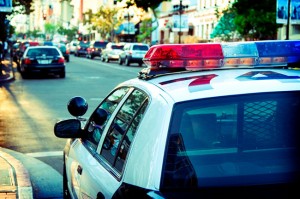How to Interact with Police While Carrying
6th Aug 2014

Here’s some helpful advice for interacting with the police as an armed citizen. First, second, third and most importantly, know the law in your state and any state that you’re traveling through while armed. Can you legally go into restaurants which serve alcohol, even if you’re not drinking? Can you carry inside a bank? The most important part of the law you need to know is whether you are legally required to inform any officer you’re interacting with that you’re carrying.
I live in Michigan, and we are required by law to immediately tell an officer that we’re carrying. Most citizen interaction with police officers will be during traffic stops, and if you are carrying and have a “duty to inform” the officer, put your hands on the steering wheel and calmly and politely let him know that you have a concealed carry weapon (CCW) permit—or whatever it’s called in your state, in Michigan it’s a concealed pistol license (CPL)—and that you are armed.
Try not to use the word “gun,” which is a trigger word for cops. If the officer has a partner on the other side of the car, and all the partner hears is “gun,” things could get interesting. Say you’re armed, carrying a firearm or have a pistol.
Cops are people. Some are great, but some are jerks. Some are pro-gun, some vehemently hate citizens who carry because they see them as a threat to their authority, or as a danger to the public. It is extremely important to stay calm and polite no matter what happens.
If your state doesn’t have a requirement to notify police officers that you are armed, that’s a decision you’ll have to make. I’ve spent time in and traveled through a lot of states that don’t have a reporting requirement. Personally, I don’t feel it’s any of their business; I’m armed and they’re armed, so the only difference between us is their vocation. In those states where legal, I will only inform an officer when they’re likely to find out anyway, like during a pat-down, or if they ask me to get out of my car.
There is a strong possibility that the police officer might want to secure your gun “for their safety” until they’re done with the traffic stop. Many cops feel that they have a duty to disarm you when you inform them that you’re carrying, which is one reason I don’t unless the law requires it. While I have very strong opinions about being disarmed by someone who doesn't have any more of a state or federal constitutional right to carry a gun than I do, the fact of the matter is if you refuse to hand over your gun, you are more than likely to be on the ground with the officer’s Glock screwed into your ear.
One famous Michigan story involves an anti-gun cop right after our state passed Shall Issue legislation. She did a traffic stop on a CCW holder, and when he informed her he was carrying she demanded his gun. As he handed it over, she accidentally shot him with his own gun. He lived and she got fired, but sheesh. In my experience, the more crime there is in the area, the less the cops will mess with you or care that you’re armed—they have real crime to deal with—as long as you don’t look or act like a criminal.
Open carry is legal in more states than you would think, and in most of them—like Arizona—the cops are either pro-gun or used to seeing guns. As long as it stays in the holster, you’ll rarely have an issue in those parts of the country.
If you are ever involved in an altercation where you’ve had to draw your weapon—even if a shot isn’t fired—and the cops are called, you need to be both calm and unthreatening. Unless you’re holding someone at gunpoint, your pistol should be holstered and out of sight, or plainly visible a good distance away from you, visibly unloaded (magazine out, slide locked back). If you ever have to draw your weapon—even if you don’t point it at someone—you should contact the local police department and advise them what happened, even if the other guy ran away. There’s always the chance that the felonious dirtbag you scared away called the cops and told them you were waving your gun around, threatening to shoot him for no reason.
Plainclothes DEA agents frequently work undercover and are taught not to raise their voices when confronted by uniformed officers. They are told to move slowly, keep their hands in plain view, and in very calm, measured tones inform the officers that they are federal agents. Why? As a former cop, I can tell you if you roll up on a situation and someone starts yelling at you, no matter what he’s yelling, it’s going to escalate the situation. Staying calm and polite keeps the officers calm and polite.
Finally, if you do find yourself involved in a shooting, say only the bare minimum to the officers responding. For example, “I live here, this man broke in and I was in fear for my life, so I shot him.” That’s the most you should ever tell them before talking to an attorney. It may seem rude, and you may spend a few days in jail while they sort out the physical evidence, but that is definitely preferable to the alternative. Remember, even though the police may seem sympathetic and on your side, everything you say can and will be used to build a case against you.
